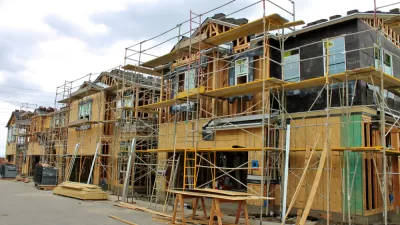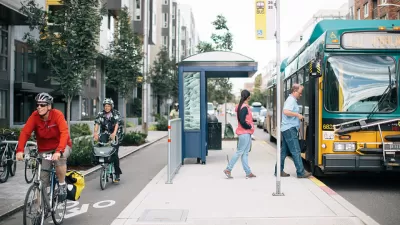As cities build upwards in an effort to create more housing and increase walkability, research shows that tall buildings intensify heat and contribute to increased carbon emissions.

"A report by the United Nations’ Intergovernmental Panel on Climate Change released on Monday looked at the relationship between housing, building structures, and broiling city blocks and found that deaths from heatwaves — like the one in Chicago [in 1995] — are not a coincidence," reports Adam Mahoney. The "report found that the single biggest contributor to amplifying heat and warming in cities is 'urban geometry,' the relationship between city layouts, building construction, and density," and that "[t]he main problem driving the so-called 'heat-island effect' is tall buildings." Because of this, "[u]rban centers can range as much as 22 degrees warmer than nearby rural areas."
[C]ities and states across the country — in Ohio, New York City, and back in Chicago, developers are building taller affordable housing, going up, not out, in an effort to create density, walkable neighborhoods where infrastructure costs are lower and jobs, stores, and homes are closer together. The trick is finding a solution that offers everyone safe and quality housing without overheating the planet.
John Mandyck, CEO of the Urban Green Council in New York City, says "[c]ities could create gardens in the sky, which have successfully offered natural cooling and improved air quality in cities like Chicago, as well as planting trees and bushes to shade sidewalks and streets." Other solutions include reflective roofing systems, which in New York City alone prevent "an estimated 2,500 tons of CO2 emissions every year."
While building up may mitigate the housing crisis, "it’s not even one percent of the solution to our environmental problems because it adds challenges even as it mitigates some," says Rick Cole, executive director of the Congress for New Urbanism. "More than 25 years after that first Cabrini tower came down, U.S. cities are much more equipped to tackle housing problems and the climate crisis, but action requires political willpower and individual sacrifices."
FULL STORY: Tall buildings: Good for the housing crisis, bad for the climate crisis

Planetizen Federal Action Tracker
A weekly monitor of how Trump’s orders and actions are impacting planners and planning in America.

Maui's Vacation Rental Debate Turns Ugly
Verbal attacks, misinformation campaigns and fistfights plague a high-stakes debate to convert thousands of vacation rentals into long-term housing.

San Francisco Suspends Traffic Calming Amidst Record Deaths
Citing “a challenging fiscal landscape,” the city will cease the program on the heels of 42 traffic deaths, including 24 pedestrians.

Amtrak Rolls Out New Orleans to Alabama “Mardi Gras” Train
The new service will operate morning and evening departures between Mobile and New Orleans.

The Subversive Car-Free Guide to Trump's Great American Road Trip
Car-free ways to access Chicagoland’s best tourist attractions.

San Antonio and Austin are Fusing Into one Massive Megaregion
The region spanning the two central Texas cities is growing fast, posing challenges for local infrastructure and water supplies.
Urban Design for Planners 1: Software Tools
This six-course series explores essential urban design concepts using open source software and equips planners with the tools they need to participate fully in the urban design process.
Planning for Universal Design
Learn the tools for implementing Universal Design in planning regulations.
Heyer Gruel & Associates PA
JM Goldson LLC
Custer County Colorado
City of Camden Redevelopment Agency
City of Astoria
Transportation Research & Education Center (TREC) at Portland State University
Jefferson Parish Government
Camden Redevelopment Agency
City of Claremont





























